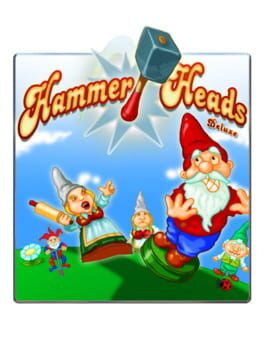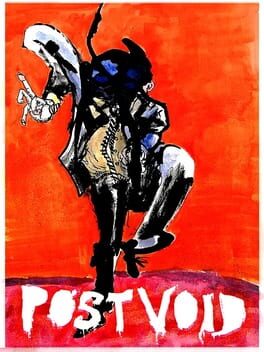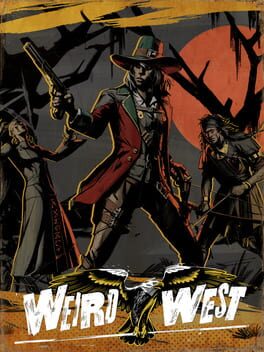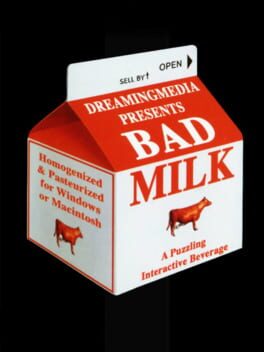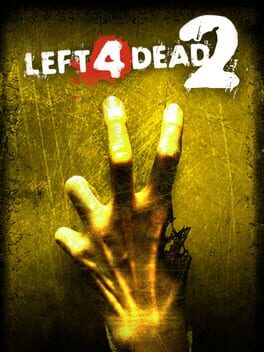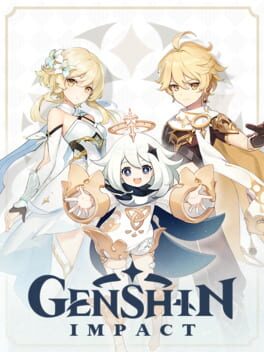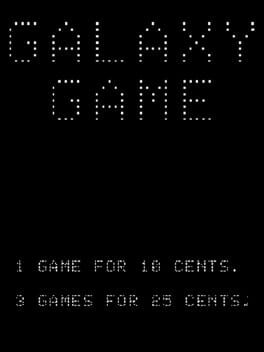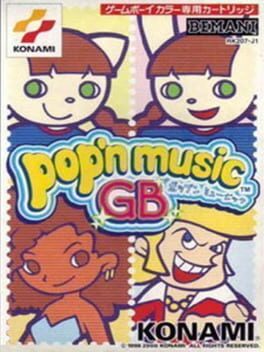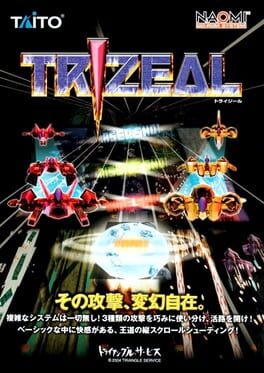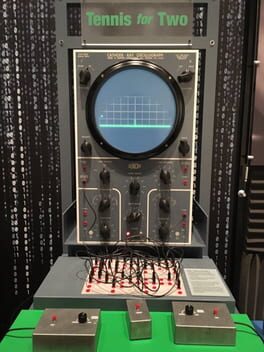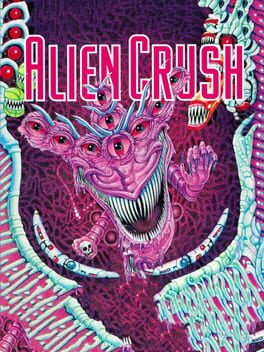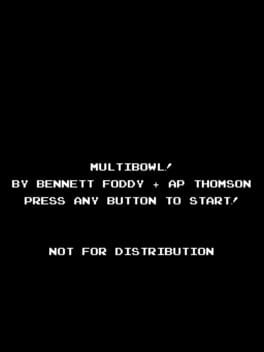Mrtrucktimist05
58 Reviews liked by Mrtrucktimist05
Hammer Heads Deluxe
2006
Post Void
2020
Weird West
2022
This review contains spoilers
Lovely little wild west romp that lets you run amok in a barely holding on supernatural county.
While it has some great ideas there to be fleshed out, such as the vendetta system and the twin stick shooting, a lot of it doesn't land. You will find that a lot of the good of the games comes from its art direction, voice acting and oddness of the first two chapters.
Combat has some interesting ideas, but most skills are less useful than the inherent didge everyone has, the only ones ones I ended up using frequently enough were the tornado and the pigmans bulletproof. Other things like the ambush related ones took too long to get set up, and then by the time you're that far in the game (unless you mainlined the build) you're strong enough to not need to even bother with stealth.
In it's defense however, the chain reaction of events you can set off and then have to adapt to due to things like explosions and enemy movement is really fun when it lands. There have been a few times where by my own hand while struggling with tight stealth, I'll take the risk of an explosion while things are quiet or parkour across buildings to really shift things in my favour. If you find yourself in samey arenas (which will happen a lot) trying choosing to play differently, you might surprise yourself, even if you have to burn through supplies to support said switch up.
The setting and atmosphere are great and fun, but only for a limited time, by the time of the Hunter I was pretty done and nothing from the world building really got me anymore. Past those initial fun and disturbing ideas, it quickly gets very repetitive in tone.
There are a few other nitpicks; like the inventory system having a limit just because, too big to worry about past just dumping stuff in someone elses. The exporation really touts multiple solutions, but very often is thrown to the wayside for another stealth section. eg hit a button to activate a fire trap that will only take 1/4 of an enemies health, why not just go for knockout, that sort of thing.
The ending is very meh as well, its not exactly a twist by the time you get there and the game makes sure of that intentionally, but its hardly one to get excited about, sadly by the time of the ending I was just waiting for the game to end so I don't think that speaks very highly for it.
While it has some great ideas there to be fleshed out, such as the vendetta system and the twin stick shooting, a lot of it doesn't land. You will find that a lot of the good of the games comes from its art direction, voice acting and oddness of the first two chapters.
Combat has some interesting ideas, but most skills are less useful than the inherent didge everyone has, the only ones ones I ended up using frequently enough were the tornado and the pigmans bulletproof. Other things like the ambush related ones took too long to get set up, and then by the time you're that far in the game (unless you mainlined the build) you're strong enough to not need to even bother with stealth.
In it's defense however, the chain reaction of events you can set off and then have to adapt to due to things like explosions and enemy movement is really fun when it lands. There have been a few times where by my own hand while struggling with tight stealth, I'll take the risk of an explosion while things are quiet or parkour across buildings to really shift things in my favour. If you find yourself in samey arenas (which will happen a lot) trying choosing to play differently, you might surprise yourself, even if you have to burn through supplies to support said switch up.
The setting and atmosphere are great and fun, but only for a limited time, by the time of the Hunter I was pretty done and nothing from the world building really got me anymore. Past those initial fun and disturbing ideas, it quickly gets very repetitive in tone.
There are a few other nitpicks; like the inventory system having a limit just because, too big to worry about past just dumping stuff in someone elses. The exporation really touts multiple solutions, but very often is thrown to the wayside for another stealth section. eg hit a button to activate a fire trap that will only take 1/4 of an enemies health, why not just go for knockout, that sort of thing.
The ending is very meh as well, its not exactly a twist by the time you get there and the game makes sure of that intentionally, but its hardly one to get excited about, sadly by the time of the ending I was just waiting for the game to end so I don't think that speaks very highly for it.
Bad Milk
2000
Left 4 Dead 2
2009
Genshin Impact
2020
Galaxy Game
1971
Pop'n Music GB
2000
The presentation on this game is absolutely killer. All the characters are rendered and animated beautifully in that lovely Game Boy Color style, along with the UI and other visual elements. The music consists of (what I assume are) classic Pop'n Music tracks remixed for the GBC and they also sounds incredible. Seriously, even if you're like me and don't really know much about the series, you should boot this up in an emulator because it just looks and sounds great. As for playing, well, Pop'n already looked pretty tough just in Arcade form, and it does not translate well to a controller. There were times when I felt like I had a good grip on the layout, only for the game to immediately throw something my way that completely reset my brain. The game involves pressing left, up, right, A, and B, as notes come down to one specific button, and it's an extremely tough layout to memorize. Asking me to press some at the same time or to switch rapidly between them just felt mean. I'm willing to bet there are people out there who have complete control over every track in this game, and I salute them, their brains are simply bigger than mine. Maybe it's easier on an actual GBC, since the buttons are closer together. But like I said, I think anyone who has any affection for the GBC should boot this up at least once, it's a neat little thing.
Trizeal
2005
This was very forgettable overall but watching the 1cc really helped me get the attention span to watch The Seventh Seal by Bergman
Tennis for Two
1958
Alien Crush
1988
Multibowl
2016
Unequivocally the best video game ever made, though that has to be cheating, right? After all, you wouldn’t say your Raspberry Pi loaded with ROMs is itself a video game. An official compilation already stretches the definition of a video game, much to the chagrin of any dweeb trying to weasel their way out of providing an actual list of their favourite games. Yet this unofficial potpourri does what a mere compilation cannot, what your ROM library fails at. Multibowl! puts these games on equal footing with one another, contextualises them, renders their objectives concrete, and synthesises them into a new, greater whole. It is the wet dream of the games historian, the archivist, the obscura-seeker, the high-score-chaser, the competitive gamer, the informed, the ignorant, and the creative.
Bennett Foddy and AP Thomson have unenviably plumbed the depths of numerous ROM sets to scrounge up treasures both noteworthy and forgotten, presenting them all as equals as games and micro-competitive arenas. Obvious mainstays of games history, Mario Bros., Gauntlet, Metal Slug, and NBA Jam operate as immediately recognisable artefacts with goals and control schema that are already familiar to many. However, they are just as likely to come up as titles which are not generally considered competitive and oppositional: Lemmings; Maze; Bonanza Bros. Though lacking internal mechanisms for confrontational gameplay, clever use of save states and memory analysis allow Multibowl! to check for some change in some variable to grant one player a point.
One of the greatest joys in Multibowl! is its deep cuts, its pulling up of games you have never heard of, the sort of title your eye skips over in your search for that SegaSonic Bros. ROM, titles bordering on the uncanny in their near-familiarity, games that make you quickly jot down their title out of befuddlement or glee. Games you would never reasonably play. In a vacuum of playing them on their own, those works might not hold your attention long enough to grasp their purpose or gameplay. Within the rapid pace of Multibowl!, within a framework of having no choice, they demand attention, dissection, and comprehension. The coercion for the players to stick with these titles for a mere thirty seconds acts as a microexposure to the realities of most of games history, namely the lack of anything else to do. When these games necessarily compete for your attention in backlogs and ROM sets with hundreds, if not thousands, of games, there is no reason for most players to approach an understanding of them. Why expose myself to the dregs of history when Pac-Man is right there?
A games historian, archivist, or obscura-seeker has some secondary goal for their play here, that of context and exposure. Someone like myself is not necessarily playing these for their worth as fun experiences, but to come away with a fuller understanding of games as a whole, games as a cultural expression, games as a reflection of a zeitgeist, games as escapism, games as political tools, games as violence, games as transgression, games as collaborative, games as competitive, games as more than just games. Games as a means, not an end.
Multibowl!’s real purpose is not as a game, at least not to me, but as some smörgåsbord of curatorial excellence, diversity, and inversion. It demonstrates how games have always been inventive and worthy of attention in some capacity, while still remaining semi-boundless in and of itself, conveying the unceasing work of history. Histories are forever rewritten for new contexts. The once irrelevant becomes critically important with changing tides. The once foundational becomes a historiographical assumption. With vast shifts in the goals of games histories, there will always be more to uncover, more to connect.
Here's to 1,000 more.
Bennett Foddy and AP Thomson have unenviably plumbed the depths of numerous ROM sets to scrounge up treasures both noteworthy and forgotten, presenting them all as equals as games and micro-competitive arenas. Obvious mainstays of games history, Mario Bros., Gauntlet, Metal Slug, and NBA Jam operate as immediately recognisable artefacts with goals and control schema that are already familiar to many. However, they are just as likely to come up as titles which are not generally considered competitive and oppositional: Lemmings; Maze; Bonanza Bros. Though lacking internal mechanisms for confrontational gameplay, clever use of save states and memory analysis allow Multibowl! to check for some change in some variable to grant one player a point.
One of the greatest joys in Multibowl! is its deep cuts, its pulling up of games you have never heard of, the sort of title your eye skips over in your search for that SegaSonic Bros. ROM, titles bordering on the uncanny in their near-familiarity, games that make you quickly jot down their title out of befuddlement or glee. Games you would never reasonably play. In a vacuum of playing them on their own, those works might not hold your attention long enough to grasp their purpose or gameplay. Within the rapid pace of Multibowl!, within a framework of having no choice, they demand attention, dissection, and comprehension. The coercion for the players to stick with these titles for a mere thirty seconds acts as a microexposure to the realities of most of games history, namely the lack of anything else to do. When these games necessarily compete for your attention in backlogs and ROM sets with hundreds, if not thousands, of games, there is no reason for most players to approach an understanding of them. Why expose myself to the dregs of history when Pac-Man is right there?
A games historian, archivist, or obscura-seeker has some secondary goal for their play here, that of context and exposure. Someone like myself is not necessarily playing these for their worth as fun experiences, but to come away with a fuller understanding of games as a whole, games as a cultural expression, games as a reflection of a zeitgeist, games as escapism, games as political tools, games as violence, games as transgression, games as collaborative, games as competitive, games as more than just games. Games as a means, not an end.
Multibowl!’s real purpose is not as a game, at least not to me, but as some smörgåsbord of curatorial excellence, diversity, and inversion. It demonstrates how games have always been inventive and worthy of attention in some capacity, while still remaining semi-boundless in and of itself, conveying the unceasing work of history. Histories are forever rewritten for new contexts. The once irrelevant becomes critically important with changing tides. The once foundational becomes a historiographical assumption. With vast shifts in the goals of games histories, there will always be more to uncover, more to connect.
Here's to 1,000 more.
I've read from a few places that this game was inspired by the John Cage composition 4'33, but honestly it sort of feels like a kind of sarcastic response to John Cage. The idea that I've always taken from 4'33 is that even though the musicians are silent, the audience will make some small ambient noises just from slightly shifting around in their seats or whatever else, which combined with the ambiance of the room the piece is being performed in creates a series of sounds that will be unique at each performance. This game is different though, the "game-play" of the game will be the exact same loading bar for everyone. The unique aspect comes from the fact that in order to beat the game, the player must be the only one playing for the whole 4 minutes and 33 seconds (Which is pretty easy nowadays, I wasn't interrupted a single time.) To me, this comes across as questioning why we value uniqueness in the first place. As I was waiting to win the game, I found myself wondering why it's important to be the only one who happens to be playing at this very moment when people have had this exact same experience before me and will after me. It sort of reminds of The Stanley Parable, where in that game the idea of choice and freewill is questioned by having a pre determined path and story even when the player believes they've gone off the beaten path (The ending where you jump out of bounds from the office window is a great example of what I'm talking about here). Here, there's a similar thing where even if the player may feel unique, every moment of the game is pre-determined, meaning every successful play-through will always be the same unless someone else decides to play the game during your play-through. It's never truly unique. And you can apply this to all sorts of other things as well, especially art. What does it mean to be unique if you can easily just make an exact copy of any given painting. Why is the painting being the one originally painted by the artist even matter if you can just make an exact copy of the painting? These same questions can also be asked of movies, shows, books, John Cage compositions, and as this game shows, video games.
Also I quickly want to write about how this game pushes the idea of what is a video game. The only way you can interact with it at all is by launching the game. Does that make this a movie or a video? I would argue no, because other people launching the game will reset your play-through. But that's not a change in the game itself, that's just rewinding the game to the beginning and starting it over. If you were watching a movie in hotel lobby and the staff reset the movie every time someone else glanced at the screen, would that be a video game? or even just a game? I'm not sure, but I think it's really cool that this game makes me ask. Really, that's why I like this game and other games like this. Sure, some may say they're pretentious and not worth playing, but I just love that something as simple as this can ask so many questions about the way that we think about art, uniqueness, and what it means to be a videogame.
Also I quickly want to write about how this game pushes the idea of what is a video game. The only way you can interact with it at all is by launching the game. Does that make this a movie or a video? I would argue no, because other people launching the game will reset your play-through. But that's not a change in the game itself, that's just rewinding the game to the beginning and starting it over. If you were watching a movie in hotel lobby and the staff reset the movie every time someone else glanced at the screen, would that be a video game? or even just a game? I'm not sure, but I think it's really cool that this game makes me ask. Really, that's why I like this game and other games like this. Sure, some may say they're pretentious and not worth playing, but I just love that something as simple as this can ask so many questions about the way that we think about art, uniqueness, and what it means to be a videogame.
